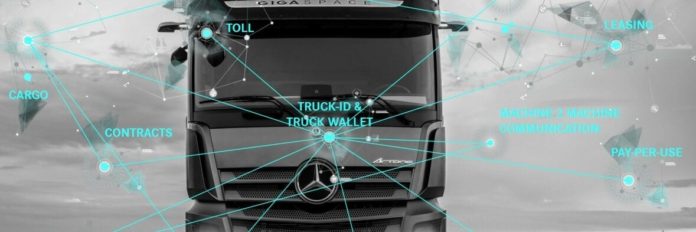
Daimler and Commerzbank have tried out how a truck can pay for a charging station without the driver having to do so, using a blockchain system.
Automakers Daimler and Commerzbank have, according to their own statements, successfully tested how payments can be processed from machine to machine on the basis of a blockchain system. As an application example, the partners outline a truck that could automatically pay for a power charging station without the driver having to take action.
But the truck gets its own wallet, as we know it from crypto currencies like the Bitcoin. Daimler sees the announcement not only as a digital purse, but also as the basis of a legally binding identity, the “Truck ID” .Therefor the telematics control unit, which is one of the current trucks of the Actros model, has received corresponding software and a separate cryptographic processor The cryptographic keys are stored securely in the “Truck Data Center”, the wireless radio technology used for communication also belongs to the equipment.
Cryptographic signature as a person of the truck
The signature with the private key of the truck ID could then, according to Daimler, serve as a kind of identity card of the truck and countersign operations. “Our goal is to turn trucks into independent players in a wide variety of application areas in the future,” explains project leader Helge Königs. “As a result, drivers can concentrate more on their actual task and transport companies benefit from a significant reduction in administration costs and safer processes.”
The charm of the car, however, is likely to unfold above all else when no driver is needed, because the trucks are fully autonomous and able to conduct their business in an identifiable manner. “Current payment systems can not yet depict such a fully automated payment process,” commented Commerzbank in its statement.
Machines pay machines
Payment at the charging station was made using a blockchain payment system developed by Commerzbank on the basis of the Corda platform. Thus, a sum can be paid in euros, which is credited to the truck wallet as a blockchain booking unit and then available in the system for transactions. When the truck pays, it is validated on the network and recorded in the distributed accounting file. Forwarders could see online which of their trucks paid for and when. Owners of such booking units can also remove them from the system and have them transferred to Commerzbank as a Euro account. Both partners do not call this – probably also – a crypto-money, but speak of e-money that meets the requirements of the financial supervision Bafin.
Corda is an open-source blockchain developed by the banking syndicate R3. Similar to cryptocurrencies, subscribers are nodes in a network with a distributed accounting of transactions. However, this is not intended as an open network like Bitcoin & Co., where anyone can participate without permission. Likewise, not every node has the knowledge of all transactions. The confirmation of a transaction is usually done by notary servers, so streamlined mining can be eliminated. Overall, the system should not create an open, bank-free cryptocurrency, but can be used by banks to depict business processes.
Daimler sees further applications as automated payments at toll stations. Likewise, the truck could carry its freight documents digitally and sign on fulfillment. Also, use of the trucks by third-party companies as well as leasing procedures could be handled, but this requires appropriate apps to interact with the truck wallet. Ultimately, it is about laying the foundation for a machine economy in which devices accept and render payments and humans as a business entity are no longer absolutely necessary. Both Commerzbank and Daimler want to explore the potential of technology in further tests with other partners.
image by Daimler

TheBitcoinNews.com – Bitcoin News source since June 2011 –
Virtual currency is not legal tender, is not backed by the government, and accounts and value balances are not subject to consumer protections. TheBitcoinNews.com holds several Cryptocurrencies, and this information does NOT constitute investment advice or an offer to invest.
Everything on this website can be seen as Advertisment and most comes from Press Releases, TheBitcoinNews.com is is not responsible for any of the content of or from external sites and feeds. Sponsored posts are always flagged as this, guest posts, guest articles and PRs are most time but NOT always flagged as this. Expert opinions and Price predictions are not supported by us and comes up from 3th part websites.
Advertise with us : Advertise
Our Social Networks: Facebook Instagram Pinterest Reddit Telegram Twitter Youtube










